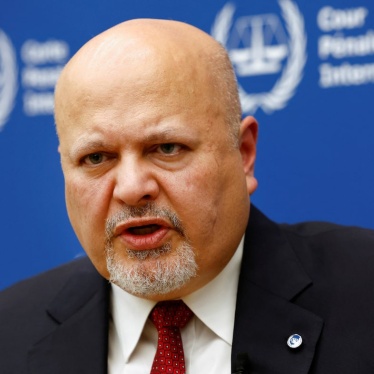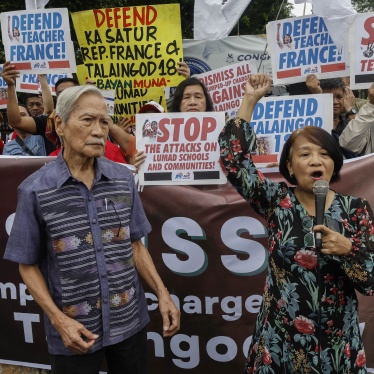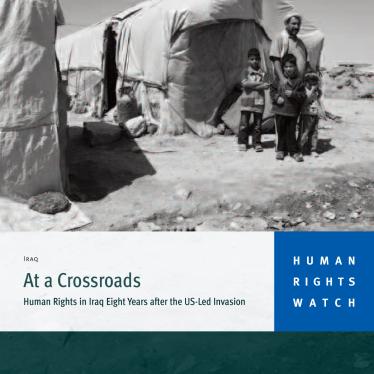Dear Mr Pichai
(cc: Ben Gomes, Vice President of Search; Kent Walker, Senior Vice President of Global Affairs)
Like many of Google’s own employees, we are extremely concerned by reports that Google is developing a new censored search engine app for the Chinese market. The project, codenamed “Dragonfly”, would represent an alarming capitulation by Google on human rights. The Chinese government extensively violates the rights to freedom of expression and privacy; by accommodating the Chinese authorities’ repression of dissent, Google would be actively participating in those violations for millions of internet users in China.
We support the brave efforts of Google employees who have alerted the public to the existence of Dragonfly, and voiced their concerns about the project and Google’s transparency and oversight processes.
In contrast, company leadership has failed to respond publicly to concerns over Project Dragonfly, stating that it does not comment on “speculation about future plans”. Executives have also refused to answer basic questions about how the company will safeguard the rights of users in China as it seeks to expand its business in the country.
Since Google publicly exited the search market in China in 2010, citing restrictions to freedom of expression online, the Chinese government has strengthened its controls over the internet and intensified its crackdown on freedom of expression. We are therefore calling on Google to:
- Reaffirm the company’s 2010 commitment not to provide censored search engine services in China;
- Disclose its position on censorship in China and what steps, if any, Google is taking to safeguard against human rights violations linked to Project Dragonfly and its other Chinese mobile app offerings;
- Guarantee protections for whistle-blowers and other employees speaking out where they see the company is failing its commitments to human rights.
Our concerns about Dragonfly are set out in detail below.
Freedom of expression and privacy in China and Google’s human rights commitments
It is difficult to see how Google would currently be able to relaunch a search engine service in China in a way that would be compatible with the company’s human rights responsibilities under international standards, or its own commitments. Were it to do so, in other words, there is a high risk that the company would be directly contributing to, or complicit in, human rights violations.
The Chinese government runs one of the world’s most repressive internet censorship and surveillance regimes. Human rights defenders and journalists are routinely arrested and imprisoned solely for expressing their views online. Under the Cybersecurity Law,[1] internet companies operating in China are obliged to censor users’ content in a way that runs counter to international obligations to safeguard the rights of access to information, freedom of expression and privacy. Thousands of websites and social media services in the country remain blocked, and many phrases deemed to be politically sensitive are censored.[2] Chinese law also requires companies to store Chinese users’ data within the country and facilitate surveillance by abusive security agencies.
According to confidential Google documents obtained by The Intercept, the new search app being developed under Project Dragonfly would comply with China’s draconian rules by automatically identifying and filtering websites blocked in China, and “blacklisting sensitive queries”. Offering services through mobile phone apps, including Google’s existing Chinese apps, raises additional concerns because apps enable access to extraordinarily sensitive data. Given the Cybersecurity Law’s data localization and other requirements, it is likely that the company would be enlisted in surveillance abuses and their users’ data would be much more vulnerable to government access.
Google has a responsibility to respect human rights that exists independently of a state’s ability or willingness to fulfil its own human rights obligations.[3] The company’s own Code of Conduct promises to advance users’ rights to privacy and freedom of expression globally. In Google’s AI Principles, published in June, the company pledged not to build “technologies whose purpose contravenes widely accepted principles of international law and human rights”. The company also commits, through the Global Network Initiative, to conduct human rights due diligence when entering markets or developing new services. Project Dragonfly raises significant, unanswered questions about whether Google is meeting these commitments.
Transparency and human rights due diligence
Google’s refusal to respond substantively to concerns over its reported plans for a Chinese search service falls short of the company’s commitment to accountability and transparency.[4]
In 2010, the human rights community welcomed Google’s announcement that it had “decided we are no longer willing to continue censoring our results on Google.cn”, citing cyber-attacks against the Gmail accounts of Chinese human rights activists and attempts by the Chinese government to “further limit free speech on the web”.
If Google’s position has indeed changed, then this must be stated publicly, together with a clear explanation of how Google considers it can square such a decision with its responsibilities under international human rights standards and its own corporate values. Without these clarifications, it is difficult not to conclude that Google is now willing to compromise its principles to gain access to the Chinese market.
There also appears to be a broader lack of transparency around due diligence processes at Google. In order to “know and show” that they respect human rights, companies are required under international standards to take steps to identify, prevent and mitigate against adverse impacts linked to their products – and communicate these efforts to key stakeholders and the public.[5] The letter from Google employees published on 16 August 2018 demonstrates that some employees do not feel Google’s processes for implementing its AI Principles and ethical commitments are sufficiently meaningful and transparent.[6]
Protection of whistle-blowers
Google has stated that it cannot respond to questions about Project Dragonfly because reports about the project are based on “leaks”.[7] However, the fact that the information has been publicly disclosed by employees does not lessen its relevance and rights impact.
In relation both to Project Dragonfly and to Google’s involvement in the US government’s drone programme, Project Maven, whistle-blowers have been crucial in bringing ethical concerns over Google’s operations to public attention. The protection of whistle-blowers who disclose information that is clearly in the public interest is grounded in the rights to freedom of expression and access to information.[8] The OECD Guidelines for Multinational Enterprises recommend that companies put in place “safeguards to protect bona fide whistle-blowing activities”.[9]
We are calling on Google to publicly commit to protect whistle-blowers in the company and to take immediate steps to address the concerns employees have raised about Project Dragonfly.
As it stands, Google risks becoming complicit in the Chinese government’s repression of freedom of speech and other human rights in China. Google should heed the concerns raised by human rights groups and its own employees and refrain from offering censored search services in China.
Signed, the following organizations:
Access Now
Amnesty International
Article 19
Center for Democracy and Technology
Committee to Protect Journalists
Electronic Frontier Foundation
Human Rights in China
Human Rights Watch
Independent Chinese PEN Centre
International Service for Human Rights (ISHR)
PEN International
Privacy International
Reporters Without Borders (RSF)
WITNESS
Signed in individual capacity (affiliations for identification purposes only):
Ronald Deibert
Professor of Political Science and Director of the Citizen Lab
University of Toronto
Rebecca MacKinnon
Director, Ranking Digital Rights
Xiao Qiang
Research Scientist
Founder and Director of the Counter-Power Lab
School of Information, University of California at Berkeley
Lokman Tsui
Assistant Professor at the School of Journalism and Communication
The Chinese University of Hong Kong
[1] See Cybersecurity Law of the People's Republic of China (2016), unofficial translation, https://www.chinalawtranslate.com/bilingual-2016-cybersecurity-law/?lang=en and Human Rights Watch, “China: Abusive Cybersecurity Law Set to be Passed,” November 6, 2016, https://www.hrw.org/news/2016/11/06/china-abusive-cybersecurity-law-set-be-passed.
[2] See GreatFire.org, Online Censorship In China, https://en.greatfire.org/analyzer.
[3] UN Guiding Principles on Business and Human Rights, https://www.ohchr.org/Documents/Publications/GuidingPrinciplesBusinessHR_EN.pdf.
[4] For example, the Global Network Initiative Principles on Freedom of Expression and Privacy, https://globalnetworkinitiative.org/gni-principles/.
[5] UN Guiding Principles on Business and Human Rights.
[6] Kate Conger and Daisuke Wakabayashi, "Google Employees Protest Secret Work on Censored Search Engine for China," New York Times, August 16, 2018, https://www.nytimes.com/2018/08/16/technology/google-employees-protest-search-censored-china.html.
[7] Amnesty International meeting with Google, August 2018.
[8] UN Special Rapporteur on freedom of expression, Report to the General Assembly on the Protection of Sources and Whistleblowers, September 2015, https://www.ohchr.org/en/issues/freedomopinion/pages/protectionofsources.aspx.
[9] OECD Guidelines, para 13, http://www.oecd.org/corporate/mne/







